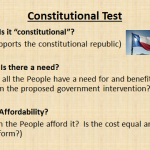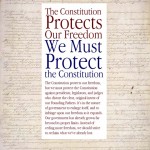All legislative matters, the conduct and actions of government officials, and the enforced ordinances and laws which restrict human activity, should pass the three question test:
1.) Is it “constitutional”?
(Supports the constitutional republic)
2.) Is there a need?
(Do all the People have a need for and benefit from the proposed government intervention?)
3.) Affordability?
(Can the People afford it? Is the cost equal and uniform?)
————————————————————————–
1.) Is it constitutional?
(Supports the constitutional republic)

This is the most confusing question to Americans due to the ignorance of the U.S. Constitution and even more so when applied to our state constitutions. Therefore, the definition of “constitutional” varies widely and is the reason our country is so divided on the purpose of our governments (city, county, state, and federal).
A constitutional republic is one thing that a pure democracy is not. In a republic, certain issues are not up for negotiation where a majority (51%) may violate certain inherent rights of a minority (49%). Doing so is mob rule, or pure democracy. A constitutional republic forbids individuals, entities, and government from infringing on certain inherent rights.
Therefore, to understand what issues are not up for negotiation or a vote of any individual or governmental body, let’s define these unalienable rights, or more easily interpreted, those un-alienable inherent rights; those human rights that no man or legislation is capable of altering through force of law or lien.
We look to the first and second paragraphs of The Declaration of Independence which aptly defines these inherent individual rights:
When in the Course of human events it becomes necessary for one people to dissolve the political bands which have connected them with another and to assume among the powers of the earth, the separate and equal station to which the Laws of Nature and of Nature’s God entitle them,..
We hold these truths to be self-evident, that all men are created equal, that they are endowed by their Creator with certain unalienable Rights, that among these are Life, Liberty and the pursuit of Happiness..
Unalienable Rights endowed by our Creator
Through our Creator, we are endowed with certain inherent characteristics that cannot be altered by man. Much like a brick of lead, lead is “heavy”. No matter what one does to lead, it maintains its heavy characteristic. One can melt it, mix it, and do a number of things to change its appearance and function but lead continues to be heavy.
Man’s inherent rights are just like lead. They cannot be altered or removed by any actions of one man or a majority of men. So let’s define these inherent unalienable Rights to those listed in the Declaration of Independence – Life, Liberty, and the pursuit of Happiness.
Life
Through our Creator, we are endowed with one definite inherent characteristic and that is the desire to protect our bodies from harm or pain; the “fight or flight” instinct. No matter what circumstances arise, all humans will react instinctively on a moment’s notice to protect their life when threat is detected. From the first breath out of the mother’s womb to the very last heart beat on this earth, no man has been successful in removing the instinct of another man to breathe and fight pain. The unborn in the womb have demonstrated the desire to avoid pain. Taking a newborn and covering its nose and mouth simultaneously will demonstrate the inherent desire to protect human life. Even medical practitioners and clergy alike have attested to those in a mental comatose state, that they demonstrate an inherent effort to avoid death, and in some instances pain.
Since man cannot control the fight or flight instinct, this instinct shall be protected and respected with an understanding that it cannot be altered. Any action by man to another man or by governments to the people contrary to the right to life is unconstitutional. Governments are specifically instituted to protect this inherent right to Life.
Liberty
Liberty = The inherent desire to control one’s actions and destiny; the right to make a choice, reap the rewards, and responsibility to accept the consequences.
Through our Creator, we are endowed with an intellectual determination to control our domain through our actions. We expect that the fruits of our labor are our rewards to be enjoyed or disposed of at our discretion without outside interference. We learn as children that we don’t know all that is necessary to be independent therefore we look to our parents, although it is naturally less and less as we reach adolescence. A child can be told that a stove is hot and not to touch it. However, the child does not understand or trust the instructions until he touches the stove against the warning. Touching the stove is the child’s liberty. He learns that it is a mistake to touch hot stoves, learns not to repeat that mistake (wisdom), and learns to respect words of caution from parents. The child now understands that his actions not only have rewards but also consequences.
Intelligence and reasoning are inherent characteristics. As responsible beings, we expect to utilize our resources in the way that we choose, to the degree that we choose, and expect to reap the benefits and accept the consequences of our actions (responsibility). We do not expect that we must give up the benefits of our labor just as we do not expect to suffer the consequences of another’s detrimental choices.
One that jumps out of a perfectly good airplane, with a parachute at 3000 feet, understands that his actions have consequences; the thrill of the ride or the end of a life. It is not the right or responsibility of anyone but that parachutist if he chooses a detrimental decision. It is his liberty to make that decision, reap the reward (thrill) and accept the consequences (death). Governments are instituted by men to protect this inherent right to liberty and any law to the contrary is unconstitutional.
Pursuit of Happiness
What was Jefferson’s definition of “pursuit of happiness”? What produces happiness? This answer is a multileveled issue but the basis of man’s happiness is from his surroundings – his relationships, his ability to provide for himself and provide for his family. This equates to property. Without property, one is dependent on another and this state of dependency produces conflict, not happiness. Man’s ability to acquire property, control his property and his subsequent right to retain that property for his rightful benefit, define “happiness” as was the Founders intent. Jefferson took John Locke’s 2nd treatise (life, liberty and property) and replaced property with happiness. Our Founders risked life, limb, and fortunes to travel over that great pond, to seek private property which was forbidden by the king, among other pleasures. They later fought the world’s greatest army to secure their property. Happiness requires the right to own and control property. Governments are instituted to protect this inherent right to own property and any law to the contrary is unconstitutional.
SUMMARY: Any actions by government (or individuals) that do NOT respect and support individual rights to life, liberty, and property (pursuit of happiness), are un-constitutional.
+++++++++++++++++++++++++++
2.) Is there a need?
(Do all the People have a need for and benefit from the proposed government intervention?)

The purpose and consequence of legislation must be understood to answer this question.
Unless legislation specifically repeals and does not replace previous laws, every piece of legislation mandates the following actions:
1.) Restricts human activity (PURPOSE)
2.) Increases the size/ scope, and operating cost of government: (CONSEQUENCE) via:
– a. Personnel to keep records of the legislation and violators (clerks; municipal, county, state, and federal)
– b. Personnel to enforce the legislation (law enforcement: PD, County Sheriff, State police, Dept. of Homeland Security, EPA, FDA, etc.)
– c. Personnel to penalize the violators of legislation (judicial) through:
– – i. Court costs
– – ii. Fines
– – iii. Imprisonment
– – iv. Loss of property via asset forfeiture
In Texas alone, we have 2700 courts and 3400 judges not to mention all of the clerks and staff to process the paperwork. Adding more legislation requires more clerks, law enforcement, and judicial staffing to penalize those violators. Add to that the structures to house the employees, office equipment, utility costs, employee benefits, and most of all the taxpayer guaranteed pensions for additional government employees.
As you can see, each city ordinance, county program, state, and federal induced law must be carefully conceived so as to insure that the cost of expanding the size and cost of government is warranted under the constitutionality of the government restricting the actions of those it is created to protect.
SUMMARY: If there is not a direct need or benefit to all the People, then it is not supportive of a constitutional republic. Even meritorious intentions have undesired consequences.
+++++++++++++++++++++
3.) Affordability?
Can the People afford it?
Is the cost equal and uniform?

THE TEXAS CONSTITUTION states…
ARTICLE 8. TAXATION AND REVENUE
Sec. 1. EQUALITY AND UNIFORMITY (a) Taxation shall be equal and uniform
THE CONSTITUTION FOR THE UNITED STATES states…
ARTICLE I, Section. 8, clause 1.
The Congress shall have power to lay and collect taxes, duties, imposts and excises, to pay the debts and provide for the common defense and general welfare of the United States; but all duties, imposts and excises shall be uniform throughout the United States;
Governments are created by and derive their limited powers from men. Government takings from one and giving to another, whether it is an individual or an entity, are in violation of equality and uniformity in taxation and revenue. This can be defined as government intervention by choosing favor with one person or entity over another for the benefit of economic development, social justice/social welfare, or the ever expanding definition of “the common defense and general welfare of the United States”.
The unraveling of the principles laid by the Founders in Article I can be seen in the sixteenth amendment to the U.S. Constitution (1913) and again with F.D. R.’s “New Deal” (1933). The sixteenth amendment removed the uniformity in taxation by the federal government and the New Deal was a series of domestic economic programs. Coincidently the 2nd plank of the communist manifesto (1848) suggests a heavy progressive or graduated income tax, and also predicts how the capitalist society of the time will eventually be replaced by socialism, and then eventually communism.
Government takings of property (taxes) through force to redistribute to another are not much different than one individual robbing a bank or his neighbor to satisfy his self-determined needs. The question must be asked that if governments would shrink and adhere to the limited powers granted by the people, and therefore decrease the cost to operate and administer programs that benefit all the people, wouldn’t the people have more property (money) to distribute at their choosing (charity) for the benefit of those in need of and requesting assistance? In the case of economic development, who produces a better product for the investment, the private sector or a governmental body?
SUMMARY: All government programs operate at the expense of the people. These programs shall be created and administered only if all the people can afford the programs and the cost is uniform to all.
+++++++++++++++++++++++++++

3 thoughts on “All Laws Must Pass the Constitutional Test”
Comments are closed.